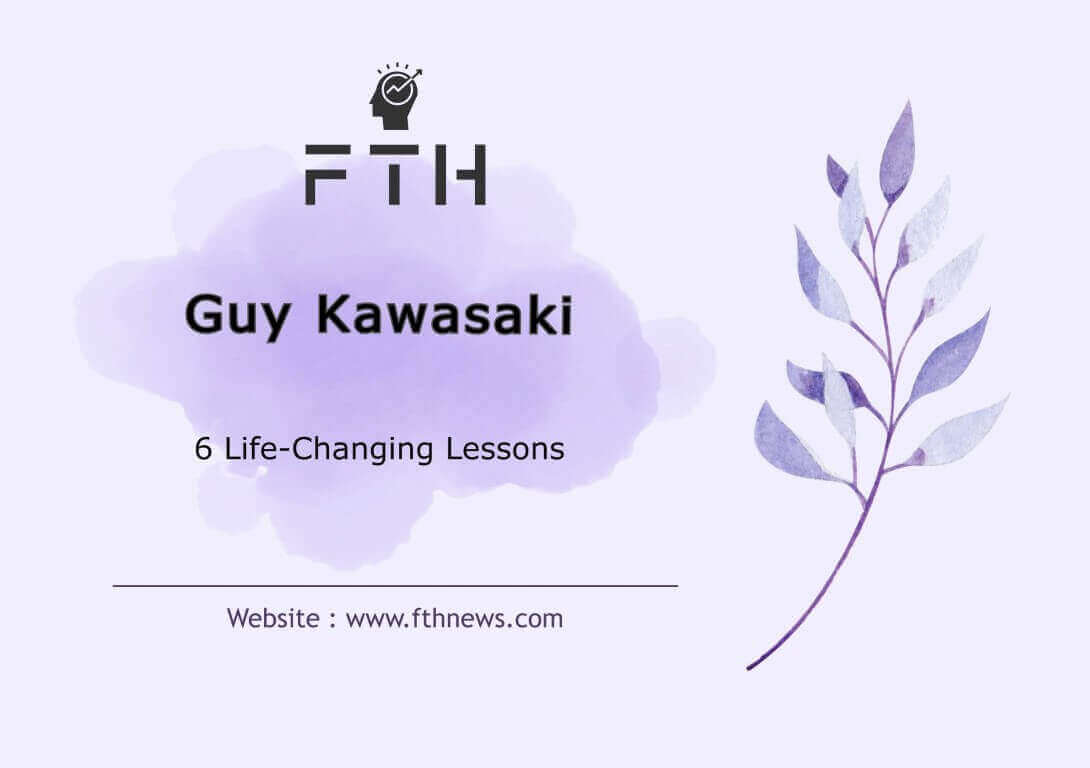
Guy Kawasaki is an American entrepreneur, author, and venture capitalist. He has traveled a long and winding road to achieve his goals, and his journey is filled with invaluable lessons. In this article, we will explore the most significant life experiences of Guy Kawasaki—experiences that offer profound life lessons. If you’re seeking advice from one of the most successful authors and leading entrepreneurs, keep reading.
Who is Guy Kawasaki?
Before delving into the golden lessons from Guy Kawasaki’s life, it’s important to get to know him a bit more. Guy Kawasaki was born in 1954 in Hawaii. He graduated from Stanford University in 1976 with a degree in psychology. Although he briefly studied law at UC Davis, he left because he was not interested in the field. Later, he pursued an MBA at UCLA while working at a jewelry company called Nova Stylings.
Kawasaki’s career took a significant turn when he landed a job at Apple, thanks to a friend. He also worked for ACIUS but soon left to follow his true passion: writing. Kawasaki’s talent and passion for writing have led to many successful books, earning numerous awards.
With a managerial and entrepreneurial mindset, Kawasaki has worked with notable companies like Canva, Google, and Wikipedia. He has founded several software systems and companies, including 4th Dimension, Fog City Software, and Garage Technology Ventures.
6 Life-Changing Lessons from Guy Kawasaki
Kawasaki’s numerous successes have made him a source of inspiration and motivation worldwide. His books are bestsellers, and everyone is eager to uncover the secrets of his success. Here are some of the key lessons from Guy Kawasaki’s life that can have a significant impact on both your professional and personal life.
1. Ask Questions
Kawasaki emphasizes the importance of asking questions as a fundamental approach to understanding reality. He believes that unknowns bring fear and stress, and that questioning is a powerful way to dispel these feelings. According to Kawasaki, when someone presents a confident assertion, it is crucial to ask questions and seek details. This not only helps in uncovering the truth but also deepens your understanding of the subject at hand.
This approach is vital even when you’re unsure about the truth of a matter. Instead of accepting information at face value, engage in a process of inquiry. Ask “why” and “how” to peel back the layers of information and gain a clearer picture. Kawasaki’s method encourages a mindset where your thoughts are always probing and seeking answers, allowing you to navigate life’s uncertainties with logic and clarity.
In a professional setting, this habit of questioning can lead to innovation and improvement. By challenging the status quo and exploring new possibilities, you can identify opportunities for growth and avoid potential pitfalls. In personal life, it fosters critical thinking and self-awareness, helping you make more informed decisions.
For Kawasaki, the essence of asking questions lies in its ability to turn fear into curiosity and uncertainty into understanding. This mindset has been a cornerstone of his success, driving him to continuously learn and adapt in a rapidly changing world.
2. Don’t Stop Learning
Many people mistakenly believe that their learning period ends with formal education, but this is a major misconception. Kawasaki asserts that continuous learning is essential to truly living. He firmly believes that if you’re not constantly acquiring new skills, you’re stagnating. Learning is a lifelong journey with no finish line.
To illustrate this, consider that Kawasaki started learning to surf at the age of 62. This example underscores his commitment to continuous self-improvement and the belief that it’s never too late to start something new.
Whether you’re pursuing a new language, music, a favorite sport, or any other new experience, the key is to keep learning. This ongoing process not only keeps your mind sharp but also opens up new opportunities and perspectives. Kawasaki emphasizes that not trying to acquire new skills can lead to mental stagnation, regardless of your age.
In today’s fast-paced world, the ability to adapt and learn new things is more important than ever. Continuous learning helps you stay relevant in your career, fosters creativity, and enhances your problem-solving abilities. It also brings a sense of accomplishment and fulfillment, contributing to your overall well-being.
Kawasaki’s approach to learning is a reminder that the pursuit of knowledge and skills should never cease. Embrace a mindset of lifelong learning, and you’ll find that each new skill and experience enriches your life in unexpected ways.
3. Be Yourself
“Be yourself” is a lesson we’ve all heard before, but Kawasaki stresses its importance in both personal and professional contexts. Many of us fear being our true selves, especially in the workplace, where there’s often pressure to conform to certain expectations or roles. Kawasaki advises that authenticity is key to long-term success and personal fulfillment.
Pretending to be someone else is exhausting and unsustainable. When you put on a façade, you’re constantly expending energy to maintain that illusion, which can lead to burnout and dissatisfaction. Authenticity, on the other hand, is unique and valuable. It allows you to leverage your genuine strengths and perspectives, which can set you apart in a competitive environment.
Kawasaki emphasizes that avoiding reality and honesty burdens you with lies and inconsistencies. This not only complicates your life but also prevents you from forming genuine connections with others. When you’re authentic, you attract people who appreciate and respect the real you, fostering more meaningful and supportive relationships.
Moreover, being yourself enables you to simplify your life. When you’re true to your values, goals, and desires, decision-making becomes clearer and more straightforward. This authenticity also translates into greater confidence and resilience, as you’re not constantly second-guessing your actions or living in fear of being “found out.”
Kawasaki’s advice to be yourself is a powerful reminder that authenticity is the foundation of genuine success. Embrace your true self, and you’ll find that both your personal and professional lives become richer and more fulfilling.
4. Ask for Help
Asking for help can be challenging for many people, often due to pride, fear of rejection, or the misconception that it signifies weakness. However, Kawasaki emphasizes that asking for help is crucial for building strong and meaningful relationships. It reveals the depth and resilience of your connections, as it invites mutual support and understanding.
Kawasaki suggests that asking for help can actually enhance relationships. When you seek assistance, you provide others with the opportunity to contribute and feel valued. Helping others brings a sense of satisfaction and fulfillment, reinforcing the bonds between you. We all have unique abilities and perspectives, and sharing these resources benefits everyone involved.
Don’t be shy about asking for help; it doesn’t signify failure. On the contrary, it demonstrates humility, self-awareness, and a willingness to grow. By reaching out, you show that you value the expertise and support of others, which can foster stronger connections and a sense of community. Contrary to what some may believe, asking for help doesn’t tarnish your image but rather strengthens your bonds with others and showcases your collaborative spirit.
Moreover, asking for help can lead to new insights and opportunities. It can open doors to knowledge, resources, and networks that you might not have access to on your own. This collaborative approach can accelerate your personal and professional growth, as it allows you to leverage the strengths of your community.
Kawasaki’s advice to ask for help is a reminder that we are all interconnected. Embrace the vulnerability of seeking assistance, and you’ll find that it not only enriches your life but also builds a supportive and thriving network around you.
5. Look for Challenging People
Surrounding yourself with people who challenge you is crucial for personal and professional growth. Kawasaki’s experience with Steve Jobs provided him with invaluable lessons and highlighted the importance of being in the company of individuals who push you beyond your comfort zone. He advises against taking the easy and familiar routes; instead, seek out challenges that promote growth and learning.
When you surround yourself with challenging people, you are constantly stimulated to think differently, innovate, and strive for excellence. These individuals will not let you settle for mediocrity; they will push you to question your assumptions, rethink your strategies, and aim higher. This environment of constant challenge fosters resilience, creativity, and a growth mindset.
Kawasaki’s journey exemplifies the benefits of this approach. Working with Steve Jobs, he was exposed to a relentless pursuit of perfection and innovation. This experience not only taught him about the high standards necessary for success but also ingrained the importance of remaining flexible and open to new ideas. Challenging people can offer new perspectives and insights that you might not encounter within your comfort zone.
In your personal life, this principle is equally valuable. Surrounding yourself with friends and mentors who challenge your beliefs and encourage you to grow can lead to profound personal development. These relationships can help you see your blind spots, overcome obstacles, and achieve goals that you might not have thought possible.
Kawasaki’s advice to seek out challenging people is a call to embrace discomfort and uncertainty. By doing so, you place yourself in an environment conducive to continuous improvement and innovation. This proactive approach to personal and professional development can lead to greater achievements and a more fulfilling life.
5. Look for Challenging People
Surrounding yourself with people who challenge you is crucial for personal and professional growth. Kawasaki’s experience with Steve Jobs provided him with invaluable lessons and highlighted the importance of being in the company of individuals who push you beyond your comfort zone. He advises against taking the easy and familiar routes; instead, seek out challenges that promote growth and learning.
When you surround yourself with challenging people, you are constantly stimulated to think differently, innovate, and strive for excellence. These individuals will not let you settle for mediocrity; they will push you to question your assumptions, rethink your strategies, and aim higher. This environment of constant challenge fosters resilience, creativity, and a growth mindset.
Kawasaki’s journey exemplifies the benefits of this approach. Working with Steve Jobs, he was exposed to a relentless pursuit of perfection and innovation. This experience not only taught him about the high standards necessary for success but also ingrained the importance of remaining flexible and open to new ideas. Challenging people can offer new perspectives and insights that you might not encounter within your comfort zone.
In your personal life, this principle is equally valuable. Surrounding yourself with friends and mentors who challenge your beliefs and encourage you to grow can lead to profound personal development. These relationships can help you see your blind spots, overcome obstacles, and achieve goals that you might not have thought possible.
Kawasaki’s advice to seek out challenging people is a call to embrace discomfort and uncertainty. By doing so, you place yourself in an environment conducive to continuous improvement and innovation. This proactive approach to personal and professional development can lead to greater achievements and a more fulfilling life.
6. Know When to Stop
Stopping doesn’t mean failure. Sometimes, knowing when to stop is a form of victory. Guy Kawasaki’s decision to abandon his pursuit of law and explore new experiences ultimately led to his remarkable success. His father’s advice to figure out his path before turning 25 helped him break free from traditional constraints and pursue what truly resonated with him.
Kawasaki’s story highlights the importance of reassessing your path and being unafraid to change direction. When something no longer aligns with your passions or goals, it’s essential to have the courage to stop and pivot. This decision is not a sign of failure but rather a strategic move towards a more fulfilling and successful life.
Embrace the idea that not every endeavor needs to be pursued to its end. Sometimes, the most significant breakthroughs come from recognizing when to let go of a path that no longer serves you. This allows you to redirect your energy and focus on what truly matters and aligns with your interests and values.
Kawasaki’s journey also underscores the value of patience and persistence. Success and goals take time, and the road to achieving them is often filled with ups and downs. By learning from people like Kawasaki, you can gain insights into navigating these challenges and maintaining the determination needed to reach your aspirations.
In essence, knowing when to stop is about being true to yourself and your passions. It involves continuous self-assessment and the willingness to make difficult decisions for the sake of your long-term happiness and success. Trust in your journey, and remember that every stop is an opportunity to start anew, with greater clarity and purpose.
What is Guy Kawasaki famous for?
Guy Kawasaki is famous for several significant contributions:
- Chief Evangelist at Apple: Kawasaki was a key member of the Macintosh team in the 1980s, where he helped market the Macintosh computer. His innovative marketing strategies were instrumental in establishing Apple’s reputation.
- Venture Capitalist: He is the founder of Garage Technology Ventures, a venture capital firm that invests in early-stage technology startups. His work in venture capital has helped many startups grow and succeed.
- Author: Kawasaki has authored several influential books on entrepreneurship and marketing, including “The Art of the Start,” “Enchantment: The Art of Changing Hearts, Minds, and Actions,” and “The Art of Social Media.” These books offer practical advice and insights on business and leadership.
- Chief Evangelist of Canva: In this role, Kawasaki promotes Canva, an online graphic design tool, and helps expand its use and impact.
- Remarkable People Podcast Creator: He created the Guy Kawasaki’s Remarkable People podcast, where he interviews notable individuals and shares their insights and experiences.
- Academic Roles: Kawasaki is an executive fellow at the Haas School of Business at UC Berkeley and an adjunct professor at the University of New South Wales. His academic roles allow him to share his expertise with students and future leaders.
- Trustee of Wikimedia Foundation: Kawasaki served as a trustee for the Wikimedia Foundation, which oversees Wikipedia and other free knowledge projects.
Overall, Guy Kawasaki is celebrated for his contributions to technology marketing, venture capital, authorship, and education.
Conclusion Guy Kawasaki
Guy Kawasaki’s life offers invaluable lessons that can transform your approach to personal and professional growth. From asking questions and embracing lifelong learning to being yourself and seeking challenging relationships, his experiences provide a roadmap for achieving success and fulfillment. Remember, your journey won’t be smooth, but persistence, authenticity, and a willingness to learn will help you navigate the twists and turns along the way.
By applying these lessons from Guy Kawasaki, you can embark on a path of continuous growth and success. So, take these insights to heart and start making positive changes in your life today.













